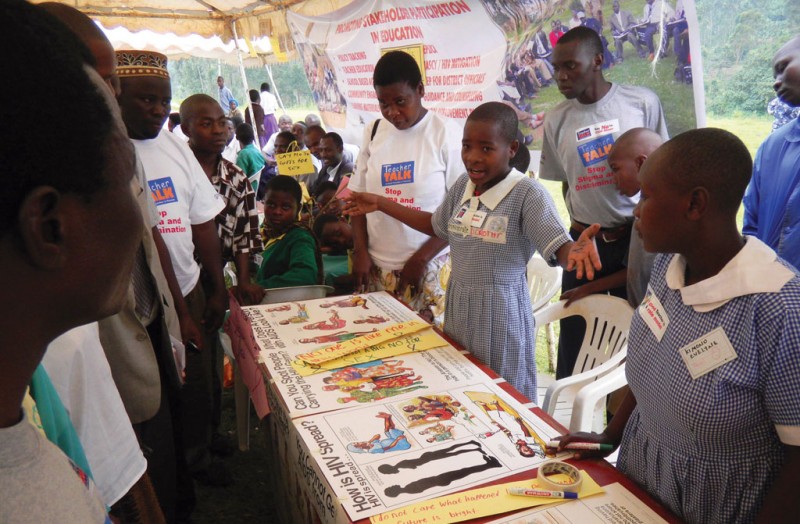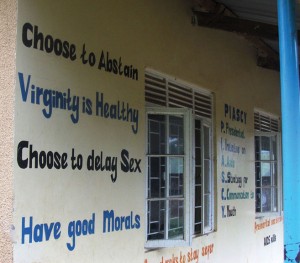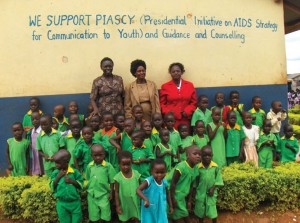UGANDA:
USAID Breaks Down Social Taboos to Fight AIDSFebruary 23, 2011
 Arguably a topic of discussion as taboo as it is human, sexual health, and all of the social and cultural implications that come with it, is not an easy subject to teach. It requires a conversation complicated enough that many people, for personal or religious reasons, just leave much unsaid. This silence is dangerous. Creating a conversational vacuum susceptible to misinformation in absence of facts can only make sexual health education more complex.
Arguably a topic of discussion as taboo as it is human, sexual health, and all of the social and cultural implications that come with it, is not an easy subject to teach. It requires a conversation complicated enough that many people, for personal or religious reasons, just leave much unsaid. This silence is dangerous. Creating a conversational vacuum susceptible to misinformation in absence of facts can only make sexual health education more complex.
In Uganda, silence on issues related to sex may be the social norm, but in the face of the African nation’s HIV/AIDS pandemic, there have been an increasing number of Ugandans who believe such a mentality is simply no longer an option. With seven million school children and a population aged ten to twenty-four making up thirty-three percent of the country, sexual health education supported by the Presidential Initiative on AIDS Strategy for Communication to Youth (PIASCY), is the key to protecting youth from making harmful decisions while providing the building blocks for a safer future. The PIASCY program is implemented by Creative’s Ugandan Initiative for TDMS and PIASCY (UNITY), a USAID-funded program.
“You can’t talk about HIV/AIDS without dealing in the issue of sex education,” said Alice Ibale, UNITY’s HIV Program Manager, “but in Uganda, talking openly about sex is taboo.” When PIASCY was introduced in 2003, implementers like Ibale were left to ask themselves, how can we educate youth about HIV/AIDS if we cannot talk openly about sex? Taking on one of the greatest development challenges in history is a tall order, but having to balance an effective curriculum with the limits of social mores has presented its own challenges.“I myself was confronted,” said Ibale when recalling an incident with a headmaster, “he said to me, you have come to spoil our children.” Individuals opposed to opening a dialogue fear that doing so, will expose children to ideas that they may feel compelled to act upon. But armed with just patience and words, Ibale was able to counter this attitude. “So we would discuss it and bring it out into the open until they actually accepted that, yes, it’s time we talked.”
 Putting differences aside, teachers agreed to talk with their students, but were not fully prepared for what they heard. ”When we went to the children with information, we found that what we thought was too strong, they thought was too soft,” said a head teacher at Budo Junior School, an Anglican-run institution west of Kampala. ”Where we were being modest, the children were being very open. They showed this in the pictures they drew, the stories they wrote and the questions they asked.”
Putting differences aside, teachers agreed to talk with their students, but were not fully prepared for what they heard. ”When we went to the children with information, we found that what we thought was too strong, they thought was too soft,” said a head teacher at Budo Junior School, an Anglican-run institution west of Kampala. ”Where we were being modest, the children were being very open. They showed this in the pictures they drew, the stories they wrote and the questions they asked.”
Educators quickly realized that dissemination of information, though an important piece is only part of the issue. “We didn’t actually realize that the children know,” recalled Ibale, “they have so much information around them but they need to be helped to process some of this information to know what is dangerous to them, to know what is supposed to be done.” Much of UNITY’s success implementing PIASCY can be attributed to the project’s creation of a support network designed to provide children with various outlets for communicating their personal feelings with peers and to teachers, without the influence of social pressures.
Specifically, implementers have seen notable success using the arts as a communication tool, helping youth to process available information through music, dance and drama. The arts provide a medium in which students and teachers are able to interact together, while transcending the typical anxiety of a discussion about sexual health. Students can express themselves collaboratively through rhythm and sound, languages that offer freedom from the weight of group discussion, or they can confront tougher questions as characters on a stage, an effective abstraction of the reality students are left to reconcile. The value of UNITY-funded arts programs is in their ability to create a new kind of dialogue with a new kind of dynamic. Where nothing had existed previously, aside from formal lectures, UNITY programs have provided a means for students to feel empowered rather than reprimanded.
 Because of the vast audience to be reached, media has also proven to be a valuable outlet for communicating information about sexual health and connecting individuals with educators. A UNITY-funded community-based organization, Straight Talk Foundation, publishes newsletters and produces radio shows with the intent of creating an evolving source of information to combat myths and misconceptions. Far-reaching and accessible (over 60% of Uganda is literate and 70% of homes have radios), these types of media resources have given Ugandans of all ages the opportunity to discuss issues with the comfort of anonymity. The Straight Talk Foundation offices are packed with binders of letters from individuals seeking information, and every letter with a question gets a written response from a staff member. This persistent dedication of educators has been a major contributing factor to the 24% decline in HIV/AIDS infection in the last ten years.
Because of the vast audience to be reached, media has also proven to be a valuable outlet for communicating information about sexual health and connecting individuals with educators. A UNITY-funded community-based organization, Straight Talk Foundation, publishes newsletters and produces radio shows with the intent of creating an evolving source of information to combat myths and misconceptions. Far-reaching and accessible (over 60% of Uganda is literate and 70% of homes have radios), these types of media resources have given Ugandans of all ages the opportunity to discuss issues with the comfort of anonymity. The Straight Talk Foundation offices are packed with binders of letters from individuals seeking information, and every letter with a question gets a written response from a staff member. This persistent dedication of educators has been a major contributing factor to the 24% decline in HIV/AIDS infection in the last ten years.
Despite the influx in available information, complacency will continue to challenge educators to invent new ways to reach people. By utilizing tools such as media and the arts, educators can provide information and a means of processing this information, but the willingness of people to speak openly with one another is still perhaps the most influential factor. As educators and implementers are just some of the voices in the network of people involved in combating HIV/AIDS, UNITY stands as a true success story. UNITY empowered students with knowledge and confidence. UNITY has also proven that the message to rise above negativity and to challenge misconceptions has the potential to outweigh myth and taboo born out of silence.
—Garrett McIndoe
